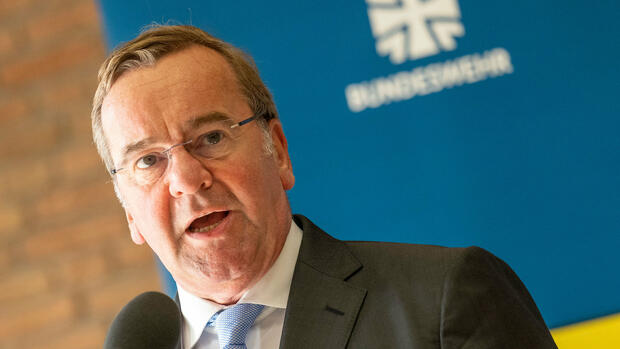Germany often appears as the “orphan with a clean slate,” says the SPD politician.
(Photo: dpa)
Berlin Federal Defense Minister Boris Pistorius has spoken out in favor of a reorientation of German foreign and security policy in a multipolar world. “We need a security policy with attitude,” said the SPD politician on Wednesday evening at an event organized by the Federal Academy for Security Policy (BAKS) in Berlin.
Despite its Nazi past, Germany likes to appear to the world as the “orphan with a clean slate” and turns away too quickly from actors who do not fully share its own values. “It’s not enough to say we don’t play with these dirty kids,” emphasized Pistorius.
The Defense Minister demanded that politicians should think more long-term again. Because if Germany turns its back, it will no longer be able to influence countries that are insecure in the competition for the global system. This would only drive them into the arms of autocracies like Russia or China.
Pistorius is setting a different tone than Foreign Minister Annalena Baerbock (Greens), who is primarily following a moral course with her feminist foreign policy. The Greens are also the ones who want to handle arms deliveries more restrictively in the future than before with the planned Arms Export Control Act.
But you can’t win over a country like India, whose army is heavily dependent on Russian armaments, if you make it wait decades for submarine spare parts, said the defense minister.
Pistorius was there in June when the navy subsidiary of Thyssen-Krupp and the Indian company Mazagon Dock Shipbuilders Limited signed the declaration of intent to build six diesel-powered submarines in the port metropolis of Mumbai. The Federal Security Council also recently approved the export of MTU engines and tank components to India. The letter with which Federal Economics Minister Robert Habeck (Greens) informed the Economic Committee about the approval is available to the Handelsblatt.
Struggle over the Arms Export Control Act
The traffic light coalition continues to fight over the Arms Export Control Act. Pistorius also justified the fact that there was still no draft even after the traffic light had passed halfway by saying that the National Security Strategy and the China Strategy should have been adopted as a basis first. Both documents are now available.
>> Read the comment here: The new China strategy can only be the beginning
Pistorius said he was therefore confident that there would be a “manageable” arms export control law, without commenting on the timetable. German arms export policy must be guided by peace and stability, but also take into account the legitimate security interests of allies. The Defense Minister emphasized that it would be good for Germany to become a “more reliable partner” in defense cooperation.
Saudi Arabia did not explicitly mention Pistorius. But Germany is currently preventing the export of jointly produced Eurofighters to the Arab kingdom – and Chancellor Olaf Scholz (SPD) does not indicate that this attitude will change any time soon.
>> Read here: Annalena Baerbock in the USA: Practicing for a possible Trump re-election
Pistorius emphasized that the United Nations remains the central element of German security policy in the multipolar world. We will continue to make contributions to international crisis management. Politicians must also overcome the reflex to stop engaging immediately if there is a change of power somewhere that does not correspond to our expectations. It must be more about a politics of what is possible, not what is desirable.
More: Latvia and Estonia buy German air defense system
